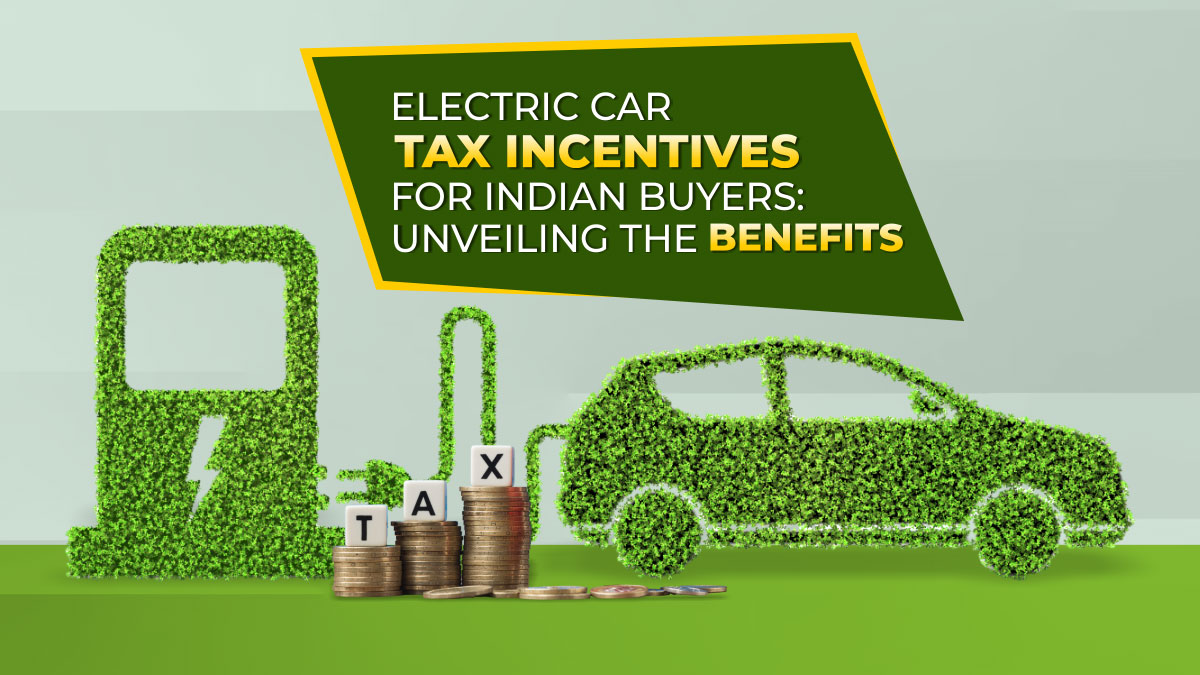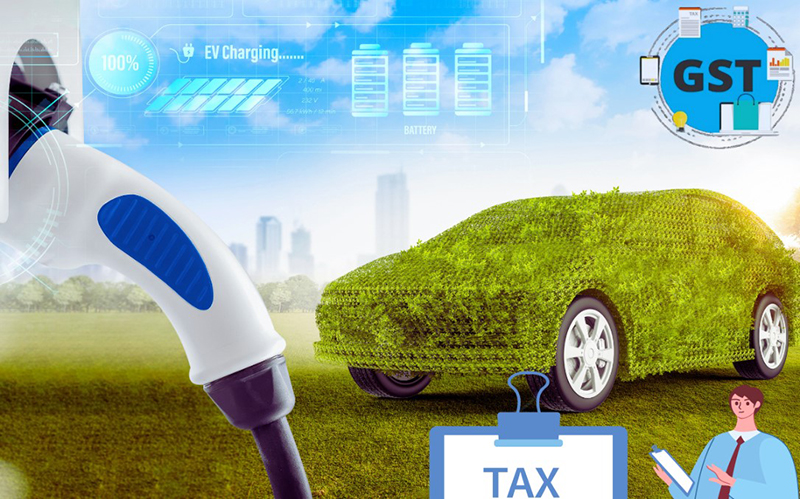
In the quest for sustainable and eco-friendly transportation, India has taken significant strides towards promoting electric vehicles (EVs). The Indian government, in its vision for a greener future, has rolled out various tax incentives and subsidies to make electric cars more accessible and attractive to consumers. These benefits not only reduce the cost of owning an EV but also contribute to the broader goal of reducing carbon emissions and fostering a sustainable environment. In this blog, we will delve into the array of tax incentives available to Indian buyers of electric cars and how they pave the way for a cleaner, greener India.
1. GST Reduction on Electric Vehicles
One of the most impactful incentives for electric car buyers in India is the reduction in the Goods and Services Tax (GST). As of August 2019, the GST on electric vehicles was slashed from 12% to just 5%. This substantial reduction makes EVs significantly more affordable. For instance, on a vehicle priced at ₹10 lakh, this GST cut translates to a saving of ₹70,000. This initiative narrows the price gap between electric cars and their internal combustion engine counterparts, making EVs a more viable option for buyers.
2. Income Tax Deduction under Section 80EEB
To further promote the adoption of electric vehicles, the Indian government introduced Section 80EEB in the Income Tax Act. This section allows individual buyers of electric vehicles to claim a deduction of up to ₹1.5 lakh on the interest paid on loans taken for purchasing an electric vehicle. This benefit is available for loans sanctioned between April 1, 2019, and March 31, 2023. It is exclusively for individual taxpayers, not companies. This deduction significantly reduces the effective cost of financing an electric vehicle, making it an attractive option for salaried individuals and small business owners.
3. State-Specific Incentives and Subsidies
To further bolster the adoption of electric vehicles, various states across India have rolled out their own EV-friendly policies. These initiatives provide additional financial and practical benefits to electric car buyers, making the transition to greener transportation even more attractive.

Road Tax Waiver for Electric Cars
Several Indian states offer significant road tax exemptions on electric vehicles, either fully waiving or partially reducing the road tax. This waiver can dramatically decrease the overall cost of owning an EV. States like Delhi, Maharashtra, and Karnataka lead the charge with comprehensive road tax relief, making electric vehicles a more financially appealing option compared to their traditional fuel-powered counterparts.
Reduced Registration Fees
In addition to road tax waivers, many states provide reduced registration fees for electric vehicles. This reduction in registration costs further lowers the on-road price of electric cars, encouraging more buyers to switch to eco-friendly transportation. For instance, states like Tamil Nadu and Rajasthan have implemented lower registration charges for EVs, facilitating easier and more affordable access to electric vehicles.
Additional Benefits for EV Buyers
Beyond financial incentives, some states offer unique perks to enhance the ownership experience of electric vehicles. These benefits include:
- Preferential Access to Carpool Lanes: In states like Maharashtra and Delhi, EV owners can enjoy quicker commutes with access to carpool lanes, saving time and reducing congestion.
- Free or Discounted Parking: Cities like Bangalore and Hyderabad offer free or reduced parking fees for electric vehicles, adding a layer of convenience and savings for EV owners.
- Subsidies for EV Charging Infrastructure: States such as Gujarat and Uttar Pradesh provide special subsidies for setting up home or community charging stations, making it easier and cheaper to maintain an electric vehicle.
These additional perks significantly enhance the practicality and cost-effectiveness of owning an electric car, encouraging more people to consider making the switch.
Examples include:
- Delhi: Offers a purchase incentive of ₹10,000 per kWh of battery capacity, up to ₹1.5 lakh for electric cars.
- Maharashtra: Provides a subsidy of ₹5,000 per kWh, with a maximum incentive of ₹1 lakh, plus an early bird incentive for the first 10,000 buyers.
- Tamil Nadu: Offers 100% road tax exemption for electric vehicles.
These state-level incentives can drastically reduce the upfront cost of electric cars, encouraging more consumers to make the switch.
4. Exemption from Green Tax and Other Charges
Electric vehicles in India are often exempt from various charges that typically apply to conventional vehicles. For instance, the proposed “Green Tax” on older, polluting vehicles does not apply to EVs. Additionally, some states offer exemptions from toll charges and parking fees for electric vehicles. These exemptions provide direct financial benefits to EV owners and recognize their role in contributing to a cleaner environment.
5. FAME India Scheme
The Faster Adoption and Manufacturing of Hybrid and Electric Vehicles (FAME) India scheme is a flagship program aimed at boosting the adoption of electric vehicles. Phase II of the FAME India scheme, launched in 2019, focuses on supporting the development of EV infrastructure and providing incentives for purchasing electric vehicles.
Under FAME II, buyers can receive incentives directly linked to the vehicle’s battery capacity. For electric cars, the incentive is ₹10,000 per kWh, with a maximum of ₹1.5 lakh. This scheme also supports the installation of charging stations across the country, addressing a major barrier to EV adoption.
It is important to note that subsidies under the FAME-II Scheme will be eligible for electric vehicles sold till March 31, 2024, the Ministry of Heavy Industries had announced recently.

6. Long-Term Savings and Environmental Impact
Electric vehicles offer substantial long-term savings beyond the immediate tax incentives and subsidies. EVs have lower running costs due to cheaper electricity and reduced maintenance requirements compared to traditional vehicles. Over time, these savings can be significant, making electric cars a financially savvy choice in the long run.
Moreover, the environmental benefits of electric vehicles are profound. By reducing reliance on fossil fuels, EVs help decrease air pollution and greenhouse gas emissions, contributing to a cleaner and healthier environment. The shift towards electric vehicles is a crucial step in India’s commitment to reducing its carbon footprint and combating climate change.
Conclusion
The diverse range of tax incentives and subsidies available to electric car buyers in India highlights the government’s dedication to promoting sustainable transportation. These benefits not only make electric vehicles more affordable but also support the larger goal of reducing carbon emissions and fostering a greener environment. As technology advances and the infrastructure for electric vehicles improves, the adoption of EVs is set to accelerate, propelling India towards a sustainable and eco-friendly future.
If you’re considering making the switch to an electric vehicle, now is the ideal time to take advantage of these benefits and join the movement towards a cleaner, greener India.
Optimize Your EV Purchase:
- Compare GST Rates: Understand the impact of GST reductions on electric vehicles.
- Explore Loan Benefits: Leverage Section 80EEB for tax deductions on EV loans.
- Check State Incentives: Look into state-specific subsidies and incentives.
- Benefit from Exemptions: Utilize exemptions from Green Tax and other charges.
- Leverage FAME II: Take advantage of incentives under the FAME India scheme.
- Long-Term Savings: Enjoy reduced running and maintenance costs.
Note: Make an informed decision and drive towards a sustainable future with electric vehicles in India.
